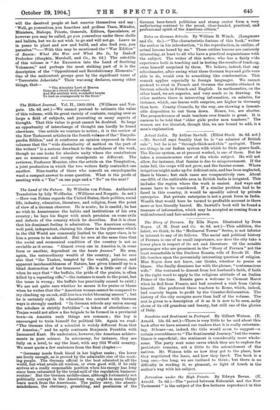The Land of the Future. By Wilhelm von Polenz. Authorised
Translation by Lily Wolffsohn. (Williams and Norgate. 5s. net.) —Herr von Polenz regards the United States, their politics, social life, industry, education, literature, and religion, from the point of view of a German observer. He is acute ; he is candid ; he has no wish to Americanise the habits and institutions of his own country ; he lays his finger with much precision on some evils and defects of the country which he describes. But it is clear that his dominant feeling is admiration. The American artisan, well paid, independent, claiming his share in the pleasures which in the Old World are commonly limited to the upper class, is to him a person to be admired But he sees at the same time that the social and economical condition of the country is not as enviable as it seems. "Almost every one in America is, in some form or another, dependent on the haute finance." He sees, again, the extraordinary wealth of the country ; but he sees also that "the Yankee, tempted by the wealth, patience, and apparent inexhaustibleness of Nature, has given himself up to a blind destruction of her treasures." (He is a little out of date when he says that " the buffalo, the pride of the prairie, is often killed by a repeating rifle,"—the instance is much to the point, but the tense is wrong ; the buffalo has practically ceased to exist.) We are not quite sure whether he means it for praise or blame when he writes that the " American woman cannot be compared to ivy climbing up an oak, still less to a violet blooming unseen"; but he is certainly right. In education the contrast with German ways is strongly marked. " In German schools any union among the scholars is strictly forbidden "—a token of absolutism : so Trajan would not allow a fire brigade to be formed in a provincial town—in America such things are common ; the boy is encouraged to train himself for political life. Again we read: "The German idea of a scientist is widely different from that of America ;" and he aptly contrasts Benjamin Franklin with Immanuel Kant. He underrates, however, the American achieve- ments in pure science. In astronomy, for instance, they are fully on a level, to say the least, with any Old World country. We must quote a few sentences from the final chapter :— " Germany needs fresh blood in her higher ranks ; the lower are lively enough, as is proved by the admirable rise of the work- ing people. The German official is the best educated in all the world, but what avails all wisdom, or even good will, if he only arrives at a really responsible position when his energy has long since been exhausted by the tread-mill of the regulation business- routine! But the German middle-class, although fortunately not politically corrupt in the American way, might in many things learn much from the Americans. The paltry envy, the absent- mindedness, the obstinacy, grumbling, and pessimism of the German beer-bench politician and stump orator form a very unflattering contrast to the proud, clear-headed, practical, and professional spirit of the American citizen."


















































 Previous page
Previous page